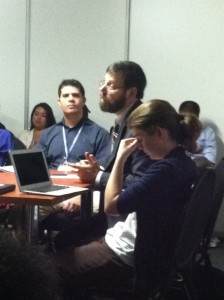Dickinson to Durban » Climate Change » Kunjani?
Kunjani?
Maggie Rees
A quick Zulu lesson…
Kunjani? – How are you?
Ngiphilile – I am well
Here in Durban, ngiphilile! I am well! But, how are the negotiations? Some say it is too early to tell. After nearly a week of negotiations, things are moving rather slowly for the decision-makers. The opening week in Durban has gone smoothly. There has been good progress with many technical decisions that needed to be made before next week.
Although some things are progressing in the negotiations, it has been noted that climate skeptics in the United States have reached a peak. Despite the science showing temperature increases, there has been a recent rise in Americans’ denial that the climate is changing. NOAA indicates that seven of the eight warmest years on record have occurred since 2001. All ten warmest years have occurred since 1995. The reality of climate change is proving to be a problem domestically in the United States. With such “bad-faith,” as some like to call it, the US is considered to be an impediment in this years climate negotiations.
Some had high hopes for America’s role in the negotiations. With Hilary Clinton’s $100 billion per year after 2020 and promises of contributions to the potential Green Climate Fund, expectations were high. The urgency is not yet there for the US. Climate policy, funding, and action are not high priorities, and concerns have been raised by the US regarding revisions for the proposed Green Climate Fund. There is still potential for a legally binding commitment agreement for 2015, so the US has not taken itself out of the negotiations just yet.
Climate fund investments have proved to be a point of contention in the United States. It needs to be noted that initial investments in climate adaptation, mitigation, and legislation are most likely better investments than working with the repercussions of the dangerous impacts of climate change. Why not invest now? The smarter investment is to prevent the costs of disaster relief from vulnerabilities to climate change.
Filed under: Climate Change · Tags: COP17, Maggie Rees









Recent Comments